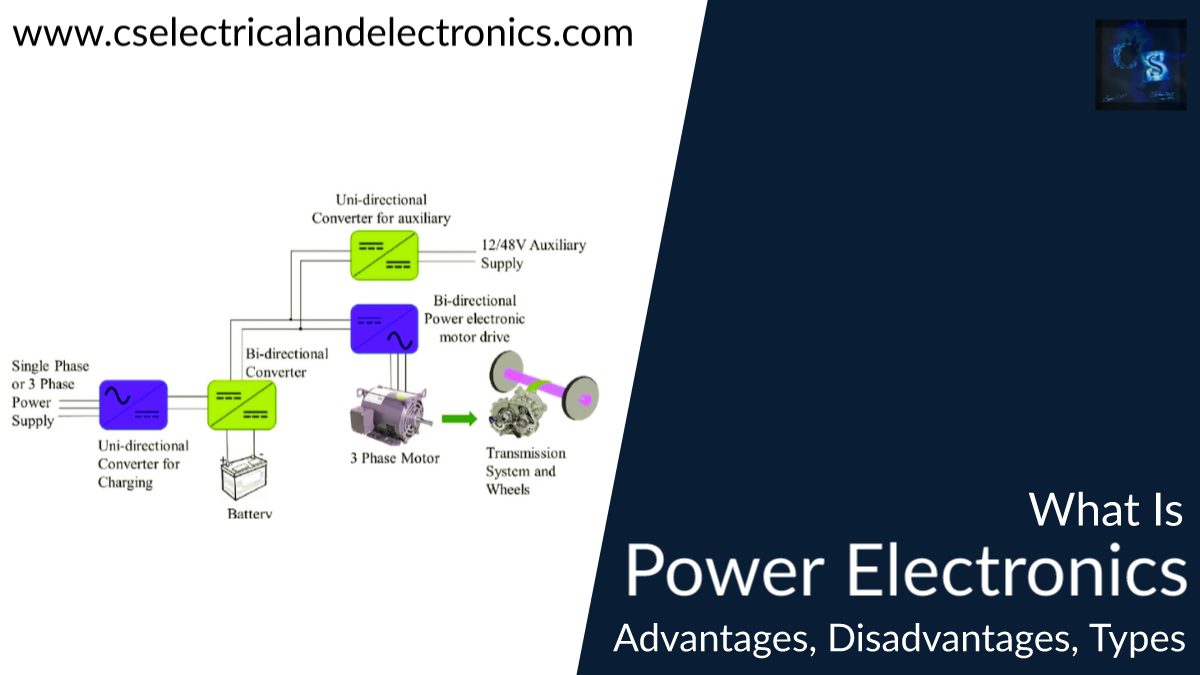What Is Power Electronics, Advantages, Disadvantages Of Power Converters
Hello guys, welcome back to my blog. In this article, we will discuss what is power electronics, the advantages, and disadvantages of power converters, and the types of power converters used for conversion.
If you have any electrical, electronics, and computer science doubts, then ask questions. You can also catch me on Instagram – CS Electrical & Electronics.
Also, read:
- What Is A Bidirectional DC-DC Converter, Circuit Diagram, Working.
- Difference Between Multiplexer And Demultiplexer In Electronics.
- UART Working, Diagram, Applications, Advantages, Disadvantages.
What Is Power Electronics
Power Electronics is an important branch of electrical and electronics engineering. Power engineering deals with the generation, transmission, distribution, and utilization of electric energy at high efficiency. Electronics engineering deals with the conversion and control of electric energy.
The electric energy in one form is given at the input. The power electronics system converts the electric energy into another form. For example, the input may be AC and the output can be DC. We know that such conversion is performed by the rectifier. Thus rectifier is a powerful electronic system. The power electronic system thus performs the conversion of electric energy. It also controls the volume of electric energy to be carried to the output. The word power means high amplitudes of current and voltage.
Power electronics is designated as a subject that deals with devices and equipment operating on the principle of electronics but rated at power level rather than signal level. Power electronics is the use of solid-state electronics for the control and conversion of electrical power.
Power electronics are based fundamentally on the switching of power semiconductor devices. With the growth of power semiconductor technology, the power handling capabilities and the switching speed of the power devices have increased remarkably.
Types Of Power Converters
Power electronics circuits are also called power converters.
A converter uses semiconductor switches to switch electrical power at high efficiency. Switches used are diodes, transistors or thyristors. Converters/controllers are classified into main categories:
01. Diode Rectifier – Rectifier circuit converters ac input voltage into a fixed dc voltage. These are uncontrolled rectifiers. Used in battery charging, electroplating, power supply, and UPS system.
02. Phase controlled rectifier ( AC to DC converters) – These controllers convert fixed ac voltage to a variable dc output voltage. These are controlled rectifiers. Used in DC drives, and chemical industries.
03. Choppers (DC to DC converters) – A chopper converts fixed dc input voltage to a variable dc output voltage. Used in DC Drives, and battery vehicles.
04. Inverters (DC to AC converters) – An inverter converts a fixed dc voltage to a voltage of variable frequency and of fixed or variable magnitude.
05. AC converter cyclo converters (AC to AC converters) – These circuits convert input power at one frequency to output power at a different frequency. Used in lighting control, and speed control of fans.
06. AC voltage controllers (AC regulators) – These converters convert fixed ac voltage directly to a variable ac voltage at the same frequency using line commutation.
Advantages Of Power Electronic Converters
- 01. Large efficiency due to low loss in power semiconductor devices.
- 02. High reliability of power electronic converter systems.
- 03. Long life and low maintenance due to the absence of any moving parts.
- 04. Small size and less weight result in less space, therefore, lower installation costs.
Disadvantages Of Power Electronic Converters
- 01. AC to DC and DC to AC converters operate at a low input power factor.
- 02. Power electronic controllers have low overload capacity.
- 03. Regeneration of power is difficult in a power electronic converter system.
This was about “What Is Power Electronics“. I hope this article may help you all a lot. Thank you for reading.
Also, read:
- 100 + Electrical Engineering Projects For Students, Engineers
- 1000+ Automotive Interview Questions With Answers
- 1000+ Electronics Projects For Engineers, Diploma, MTech Students
- 1000+ MATLAB Simulink Projects For MTech, Engineering Students
- 50 Advanced Level Interview Questions On CAPL Scripting
- 500+ Embedded System Projects For Engineer, Diploma, MTech, PhD
- 500+ Projects For Diploma Electrical, Electronics Student, Diploma Project
- 8051 Microcontroller Timers, TCON Register, TMOD Register

